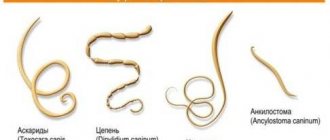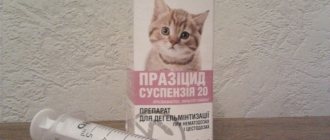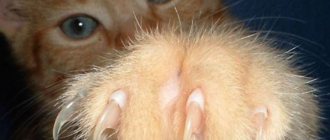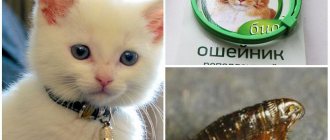How to properly remove worms from Sphynx kittens
Due to improper treatment, the animal can be poisoned or even die. To prevent this from happening, if you suspect the presence of parasites in your pet, you need to act as follows:
- To diagnose your pet, you need to show it to a veterinarian;
- prescribed medications are bought only at the pharmacy, because counterfeits are often sold at the market and in stalls, which not only will not help the cat, but will also harm;
- There are medications for worms for small kittens and for adults. A pet can die from an overdose;
- It is better for small kittens to take the drugs in suspension.
Attention! Before giving your cat any anti-worm medication, you need to carefully read the instructions.
Treating a cat with a suspension
Application of the suspension
Using a suspension is the easiest way to treat a kitten for worms. The purchased suspension must be shaken and the required dosage drawn up using a syringe. The syrup can be poured into the kitten’s cheek or mixed with food.
Folk remedies
If you find worms in your pet, you can use some folk remedies:
- feed the animal with chamomile;
- feed the cat on an empty stomach with onion tincture (cut the onion into pieces and pour warm water);
- give your pet a tincture of tansy flowers (pour boiling water over a tablespoon of flowers, leave for an hour, filter and give to the cat before eating);
- carrot juice enemas (introduce about 20 ml of juice into the anus);
- adding chopped garlic to food.
Folk remedies, unlike pharmaceutical drugs, must be given for a long time to achieve the desired effect. But they have their advantages. All tinctures used for treatment are non-toxic. Therefore, treatment with folk remedies is recommended for pregnant and lactating cats, as well as weakened kittens.
Deworming with vaccination
You can also deworm your pet using injections. This is a very effective treatment if done correctly. It is important to choose the right drug and calculate the correct dosage. When administering the injection, you need to hold the animal correctly so as not to cause harm. If this is the first injection, it is better to do it at a veterinary clinic.
How to give a kitten an anti-worm tablet
Ways to give a cat a pill:
- you need to place the cat on your lap, with its back to you, open its mouth and put a pill in it, then close its mouth and stroke the pet’s throat;
- grind the tablet well and pour the powder into water, put it into a syringe and pour it into the cat’s cheek;
- The crushed tablet can also be added to your pet's food.
Note! Particularly violent cats should be wrapped in a towel and immobilized, and then given a pill.
Scottish cat: how to worm a baby before vaccination
It is known that every year pets, including cats, need vaccination. Veterinarians strongly recommend treating the animal for worms before carrying out this procedure. This is done because the presence of parasites in the animal’s body can reduce the effectiveness of the vaccination. Therefore, ten days before vaccination it is necessary to carry out deworming.
Rules for deworming:
- the procedure cannot be performed on a sick animal;
- a drug suitable for a particular pet is selected, this requires consultation with a veterinarian;
- dosage must be observed;
- the drug is given to the cat in the morning, on an empty stomach;
- if the cat has fleas or other parasites, then 3 days before deworming, treatment is carried out against them.
This is interesting: What are the types of anti-helminth suspensions for cats?
Is it allowed to give pills to kittens?
Cats usually carry several types of worms: nematodes and cestodes. The structure of the drug may include one active substance or several that destroy parasites at any stage of development.
Manufacturers offer Prasitel for treating adults and children with a mild and effective effect. It is worth noting that the active substance immobilizes a large individual and subsequently removes helminths with feces.
There are many different drugs (Panacur, Profender, Dirofen) that can get rid of worms in one go, but it is important to follow an age-appropriate dosage, since an excess of the drug can kill a kitten.
Your veterinarian can tell you how many tablets to give and the amount of active substance that is permissible at a certain age and at a specific weight of the baby.
The market for veterinary drugs is overflowing with various drugs. For the prevention and treatment of helminthiasis, kittens are given:
- suspensions;
- pills;
- powders;
- injections.
The most commonly used products are tablets and suspensions. Not everyone can give the drug correctly. To do this, place your fingers on the corners of your mouth and press slightly; the tablet is placed on the root of your tongue.
Note! Easier to use for an animal of any age, the dosage form is a suspension. It can be poured in with a special plastic pipette or from a spoon or syringe. Prazitel is immediately equipped with such a dispenser.
READERS RECOMMEND!
Say goodbye to pests FOREVER!... An environmentally friendly device that repels rodents and insects will help in the fight against rodents and insects...
Suspension
The suspension is convenient to give to kittens. It is odorless and has a sweetish taste. Usually the drugs are given on an empty stomach; the substance can be mixed with food.
The main meal is offered after an hour to an hour and a half. Suspensions work gently, do not negatively affect the digestive system, and there is no need to give laxatives in combination to remove helminths.
The most commonly used suspensions by consumers:
- Prazitel;
- Prazicide Plus;
- Dirofen;
- Dironet;
- Febtalcombo.
Tablets and suspensions can be given to kittens from 3 weeks. First, there are some points to consider. If a kitten is taken from the street or from a shelter, it, in any case, needs to be dewormed - but a procedure should be carried out to get rid of other parasites (lice, fleas) and improve its health. Some cat breeds (British, Persian, Russian Blue) have a tendency to develop diseases of the liver and other organs. Less toxic products (suspensions) are better suited for them.
As a preventive measure, deworming is carried out every 6 months. If there is a high risk of infection (free range, rural areas) - once every 3 months. Before vaccinations, the procedure is mandatory.
Attention! Before purchasing anthelmintic tablets for worms, be sure to visit a veterinarian and calculate the exact dosage! The wrong drug or the wrong dosage can be fatal! The instructions for use must be strictly followed!
Contraindications and side effects
Anthelmintic drugs for cats have a number of contraindications and side effects:
- the kitten is less than 2 months old;
- a nursing or pregnant cat (at least 3 weeks must pass after the birth of kittens);
- the pet is underweight;
- problems with the digestive system;
- presence of infectious diseases;
- allergy to the drug.
If you follow the conditions for taking anthelmintic drugs for cats, there will most likely be no side effects. But in some cases, diarrhea, vomiting, loss of appetite and lethargy may occur.
How often to worm a cat
Therapeutic deworming is carried out immediately after detection of parasites. The dosage of the drug is determined strictly according to the instructions. Repeated treatment is carried out after 10-14 days.
The scheme of preventive deworming for cats depends on the age of the animal, living conditions (goes outside, goes to the country, has contact with rodents), region of residence.
The schemes differ according to the age of the pet:
- Kittens up to 3 months
For the first time, deworming is carried out 10-14 days before the first vaccination. The kitten at this time is approximately 1.5-2 months old. However, if the baby is sick, developmentally delayed, or weighs little, anthelmintic treatment is not carried out. The vaccine is not made either. There is no need to worm the kitten before the second vaccination. For kittens for the first time, medications based on fenbendazole (Febtal, Kanikquantel Plus, Prazitel) and milbemycin oxime (Milbemax, Milprazone) are suitable. And also Prazicide, Dirofen in the form of suspensions.
- Kittens up to 6 months
Why is regularity important?
To ensure that there are no parasites in the cat’s body, treatment with special preparations must be carried out regularly, once every 3-4 months. If you do not do this, some time after the initial procedure the cat will again develop helminths.
The risk of pathology especially increases if the pet is fed natural food. Helminthiasis is a rather dangerous disease, which is accompanied by the following disorders:
- weakening of the immune system, dysfunction of internal organs and systems;
- some parasites “intercept” the nutritional elements supplied with the food, which is why the animal develops vitamin deficiency;
- parasites produce toxins, which can cause intoxication of the body;
- With helminthiasis, the immune system devotes all its strength to fighting helminthic invasion, which is why the body does not receive full protection against various viruses and infections.
It is also worth considering that parasites can be transmitted from a kitten to humans. To provoke an infection, it is enough for a pet to rub against the owner’s hand or lick it. If there is a strong infection or parasites live in the lungs, it is enough for a cat to breathe near a person’s face to transmit the disease to him.
- I don’t want to get sick!..
Why is it so important to treat your kitten regularly for worms?
The presence of helminths in a kitten’s body poses a serious danger to its health. Worms have a detrimental effect on the pet’s body, poison it with their waste products, and damage internal organs. In advanced cases, worms form a ball in the kitten’s intestines, causing blockage and rupture of the intestinal walls. This inevitably leads to the death of the kitten.
Therefore, preventing worms in animals is extremely important. Experienced breeders and cat owners prefer to use the broad-spectrum drug Prazitel to treat their pets against worms.
Poisoning and complications after using anthelmintic drugs - what to do?
Let's look at the entire treatment regimen step by step:
- Give the medicine to the kitten.
- Make sure that after about 20-30 minutes he goes to the toilet. If this does not happen, it is necessary to give a laxative to prevent intoxication.
- Immediately after the kitten goes to the toilet, it is necessary to throw away waste products in a place inaccessible to it.
- It is advisable to stay at home all the time on the day of treatment to clean up after the kitten after each trip to the toilet.
- Check that the treatment is successful. Worms should be observed in the feces.
- After 10-12 days, repeat the procedure in the same order.
Symptoms of poisoning from kittens are similar to human symptoms: vomiting, diarrhea, weakness, drowsiness, difficulty breathing, fever, etc.
Most often, the kitten just needs to be given a little rest and provided with plenty of water. You can also give some medicine to cleanse the stomach.
If the poisoning is severe enough and there are many symptoms, you should immediately contact a veterinary clinic. There the kitten will be injected with a special saline solution and the intestines will be washed. Most likely, a course of vitamin medications will subsequently be prescribed for recovery.
How to worm a cat with a professional
Profender can be used both for deworming cats and kittens, starting from the age of 8 weeks, which exactly coincides with the period of the first vaccination for kittens carried by a vaccinated mother. Before using the drug, you must carefully read the instructions and calculate the dose depending on the weight of the animal. The drug is available in pipettes of various volumes: 0.35 ml, 0.7 ml and 1.12 ml - for small (up to 2.5 kg), medium (up to 5 kg) and large cats (up to 8 kg), respectively. When deworming animals weighing more than 8 kilograms, it is necessary to combine pipettes of various sizes, and the dose should be selected at the rate of 0.14 ml per kilogram of animal weight.
Similar article - Malaria transmission routes
After applying the drug, a small wet spot appears on the wool, which, when dried, leaves matted tufts of wool for some time and has a weak specific odor. After a few days, the fur returns to its normal state.
Only a healthy cat can be vaccinated and wormed. As a rule, there are no side effects and complications in cats, including pregnant women, when using the drug in accordance with the instructions. But after deworming, it is necessary to closely monitor the animal; when the first signs of illness appear, immediately contact a veterinarian. It is also necessary to ensure that the animal goes to the toilet, since in advanced cases, dying worms, having accumulated in the body, can lead to toxicosis.
British kittens raised in the Amber Eye nursery are regularly wormed and undergo timely vaccinations. We offer you exclusively healthy and well-groomed British kittens, who will delight you with their warm plush fur and amber eyes for many years.
Read about British cats on our website:
At what age will this be safe for health and how do children tolerate this procedure?
Author of the publication
ksena
Achievement received 10/23/2018
Similar:
It’s good that you ask this question and don’t start mindlessly pushing strange medications into a little kitten. When fighting worms, you can use tablets and suspensions. The second option is suitable for kittens. You can start deworming a kitten starting from 2 months; earlier it will not only be dangerous, but sometimes even fatal. Because the body cannot cope with the composition of the medicine. By the way, treating fleas with medications and special shampoos should also begin at this age. But here tar soap comes to the rescue; it can be taken from a very young cat’s age.
I’m afraid of harm, so I always try to find out in advance what and how best to do. There is a lot of different information on the Internet, but I still wanted to hear the opinions of people who have experienced this directly. Thanks for the answer, I didn’t know about soap)
In small kittens, infection with helminths passes very quickly and therefore they need to be given antiparasitic agents from the age of two months. I gave my babies the veterinary drug Dirofen - it helps a lot and the kittens feel good after taking it. For the first anthelmintic for Pushkinists, I bought a suspension of Dirofen - injected it with a syringe directly into the mouth (it’s more convenient). Then a month later again for preventive purposes.
I’m wondering what kind of drug it is, thank you very much for the advice)
Medicines for kittens
At what age and what to worm a kitten with depends on the general condition of the pet. If the animal’s body is weakened, it is recommended to carry out the procedure no earlier than 4 months. The choice of remedy is made together with the veterinarian.
After the examination, the doctor will tell you what is better to deworm the kitten in a particular case. The following drugs are considered the safest for small pets:
- Parasiticide for kittens – available in the form of a suspension, suitable for the treatment and prevention of helminthiasis;
- Pyrantel - produced in the form of tablets and suspensions, characterized by low toxicity;
- Kanikvatel is a safe medicine that can be given to kittens from 5 weeks;
- Milbamax is a modern low-toxic medicine;
- Trontsil-K is a broad-spectrum drug.
Such products are allowed to be used from 5 weeks of age. The dosage of the drug is calculated taking into account the weight and age of the animal. Before using each product, the owner should carefully read the instructions.
On a note! Antihelminthics are available in different forms. It is recommended to give kittens the drugs in the form of a suspension.
Trontsil-K
This is interesting: Signs of worms in a cat
Anti-worm medications for kittens
There are many medications for worms. Each pharmacy is ready to offer a wide range of various drops, suspensions, tablets and vaccines to treat your pet. But when treating a kitten, you need to be very careful in choosing means to combat helminths.
Behind the various commercial names of drugs lies a certain set of chemicals, the effects of which can be dangerous for a small organism. It is important to give medications appropriate to the kitten's age. It is better to choose time-tested drugs.
The classic deworming remedy contains two main components that affect:
- round parasites (active ingredients pyrantel, fenbendazole, piperazine or milbemycin);
- tapeworms (active ingredient praziquantel).
The most well-known products, identified by release form:
| Pills | Suspension | Drops |
| Pratel Febtal Trontsil K Milbemax | Prazitsid-plus Dirofen-paste | Profender Stronghold |
The most common release option is tablets. For the smallest kittens, Prazicide-plus, produced in the form of a sweet suspension, is best suited. This medicine is considered the safest and is suitable for kittens from 3 weeks of age.
Important! Do not give deworming medications to your kitten yourself. For safe treatment, consultation with a veterinarian is required. Only a doctor will be able to determine possible kidney and liver diseases, the weight category of the kitten and assess the general condition of the animal in order to safely prescribe medication.
When is deworming contraindicated?
If there are signs of exhaustion, both procedures are not performed.
- Acute allergic reaction to the components of the composition. Before you chase your cat away, you need to make sure that all components are safe.
- The period of gestation. The consequence may be miscarriage or death of babies in the womb.
- Presence of kidney stones.
- Lack of body weight. If your pet is exhausted, it is better to postpone the procedure.
- Diseases of viral and infectious nature. If your immune defense is weakened, you should not put additional stress on the body. The likelihood of rashes, scabies and hair loss increases.
- Little age. Until the babies are 2 months old. It is better not to give medications for parasites.
How to give medicine to a cat
Anthelmintics are produced in different dosage forms: tablets, suspension, powders, pastes, drops on the withers.
Deworming tablets are effective, but they are not easy to give to your pet. There are 3 ways to give the pill:
- Crush, mix with a small amount of water, pour into the cat’s mouth with a syringe.
- Disguise the tablet in a cat treat, grind it into powder, and add it to food.
- Secure the cat, open its mouth, place the tablet on the root of the tongue, press the mouth with one hand, and stroke the neck with the other to provoke a swallowing movement.
Drops on the withers are applied to the area between the shoulder blades so that the pet cannot lick off the product. Drops are a good option if you can’t give your cat a pill.
Suspensions and pastes come already complete with a dispenser, which is convenient for administering the medicine into the cat’s mouth. Many suspensions have a pleasant taste for cats and are eaten with pleasure.
The use of all modern anthelmintics does not depend on the timing of meals. However, veterinarians recommend giving medications 2 hours before or after meals.
Why deworm your kitten every month?
The frequency of treatments is related to the life cycle of helminths. In 3 months they manage to hatch from eggs and reach sexual maturity. If the kitten is not wormed, the parasites will begin to actively multiply.
Some people believe that only animals that regularly walk outside and eat raw meat and fish need to be dewormed quarterly. However, it is not. Any pet can become infected with helminths.
Even a kitten that does not leave the house and does not come into contact with other animals needs to be wormed quite often. The host can bring parasite eggs, for example, on clothes or shoes.
From a kitten, worms are transmitted to people. This is extremely dangerous. The eggs in the body hatch into larvae that settle in the internal organs. You may not even suspect a helminthic infestation for a long time. As a rule, symptoms become visible when most of the organ is affected.
For your information. In areas where echinococcosis is common (parasitic infestation by larvae of the tapeworm Echinococcus), cats are dewormed every month.
To minimize the risk of parasite infection, it is necessary to disinfect your cat's litter box, bowls and toys at least once a month. It is advisable to exclude raw fish and meat from the diet. To disinfect products, they are frozen for 2-3 days or scalded with boiling water.
Ways of infecting a kitten with worms
Little pets can become infected with worms, even if they have never gone outside in their lives. Street kittens are 100% likely to be susceptible to this disease.
Pets can become carriers of worms:
- having become infected from a mother cat while still in the womb or through mother’s milk;
- by eating low-quality raw meat or fish;
- playing with your outdoor shoes or clothes;
- contacting other animals that carry worms;
- hunting for flies and mosquitoes;
- If a kitten is infected with fleas, then worms will most likely be added to this disease, because Direct fleas are carriers of worm larvae.
Is it possible to get worms from a kitten?
Infection from a cat with worms is quite possible. The whole reason is that some types of parasites can live both in the animal body and in the human body. Children are at particular risk of infection. There are several ways you can get parasites from your pet. First of all, through the mouth, since the cat licks itself and spreads worms over the entire surface of the fur, which then end up on human hands, furniture, etc. Infection also occurs from the cat’s toys and litter box.
Infection of a person with worms through close contact with a cat
Deworming of kittens and cats
Where do kittens and cats get worms?
If you have picked up a kitten or an adult cat from your hands or taken it from the street, be prepared for the fact that your new family member is most likely already infected with helminths.
Parasites can be transmitted to kittens from an infected mother - even before the kittens are born, while they are in the mother's womb. Contacts with other infected animals, the presence of ectoparasites (fleas, lice eaters), poor living conditions, poor-quality feeding and consumption of raw foods (meat, fish) are some of the main ways of infection with helminths.
But even if pets live in a favorable environment and do not come into contact with infected animals, there is always a risk that worm eggs will be brought into the house on the shoes or clothes of family members. In this case, for the pet to become infected, it will be enough just to sniff things. Blood-sucking insects: fleas and mosquitoes can also carry helminth eggs.
For preventive purposes, treatment for helminths is carried out once a quarter. You need to discuss the treatment plan with a veterinarian.
Contrary to the stereotype, a pet that does not go outside can become infected with worms. Moreover, if you have never dewormed, it is most likely already infested. Unfortunately, helminth infection occurs virtually asymptomatically for quite a long time, but this is not a reason to underestimate the problem.
Helminths (they can live not only in the intestines, but also in the liver, brain, lungs and other organs) secrete waste products that slowly but surely destroy the organ where the parasites are located. They also worsen the immune system, making the body vulnerable to all kinds of infections.
Do not forget that many helminths pose a danger to humans.
Worms in kittens and adult cats: symptoms
How can you tell if a kitten or an adult cat has worms? At first, the invasion may be asymptomatic and appear only when it becomes very strong. Also, the symptoms are directly related to the health status of a particular pet and which organ is infected. There can be many nuances, but some of the common signs indicating infection include the following:
- Dull coat
- Bowel problems (diarrhea and constipation)
- Vomit
- Bloating
- Weight loss
- Weakness
- Cough: observed with severe infestation, especially as a result of roundworm infection
- Developmental delays and signs of anemia. Especially pronounced in kittens.
It is important to understand that several symptoms, or just one, can appear.
If the infestation is severe, adult parasites can be seen in the kitten's feces or vomit. Parasites gather in balls, causing constipation and intestinal obstruction.
Severe infestation poses a serious threat to the life of a pet. Especially when we are talking about fragile kittens or cats whose health is undermined by chronic diseases or a crisis period: pregnancy, surgery, etc.
How to deworm a kitten and cat
How to remove worms from a kitten or cat? Thanks to modern drugs, this is easy to do. The main thing is to choose a high-quality suitable medicine and strictly adhere to the instructions for use.
Do not give kittens anthelmintics for adult animals. This is dangerous for their health and life!
What anti-worm tablets can you give your pet? A popular drug for deworming kittens and cats is Elanco Milbemax. This is a broad-spectrum anthelmintic, prescribed for both therapeutic and prophylactic purposes to kittens from 2 months of age. Milbemax fights nematodes, cestodes and mixed invasions (Dipylidium caninum, Taenia spp., Echinococcus multilocularis (cestodes), Ancylostoma tubaeforme, Toxocara cati). To completely destroy parasites, taking one tablet is enough.
Before carrying out deworming, carefully read the instructions. For example, Milbemax for kittens is given once, but other drugs can be prescribed in two stages, otherwise the treatment will be ineffective.
Be sure to ensure that the kitten swallows the tablet. To do this, carefully open the kitten's mouth, place the tablet on the root of the tongue, and then tilt your head back a little and stroke the baby's neck from top to bottom, stimulating the swallowing movement. But masking the medicine with food is not a good idea. A “deceived” kitten will most likely ignore not only the pill, but also its entire dinner.
You may find the article “How to properly give a pill to a cat” useful.
Do not forget that deworming of kittens is a mandatory measure before vaccination. It must be carried out 10-14 days before vaccination.
Be careful, take care of your pets and may they never get sick!
Review of safe drugs
It is difficult to deworm a kitten using tablets that are used for adult cats. As a rule, they are designed for heavy weights, and determining the optimal dosage is quite difficult.
Some medications need to be given 2-3 days in a row. And this is additional stress for the kitten. Therefore, experts advise deworming pets using suspensions. They are safe and easy to use.
Important. Medicines intended for humans are not suitable for animals.
The suspension can be mixed into food during the morning meal or injected with a syringe onto the base of the tongue. Do not exceed the dosage - this will harm the health of the pet.
Taking the drug does not require additional preparation. Before deworming a kitten, it does not need to be given a laxative or kept on a starvation diet.
For storage, the suspension is placed in a dry and dark place where pets and children do not have access. Be sure to leave the original packaging. Permissible room temperature: 0…+25ºC.
Prazitel – suspension for cats and kittens
Prazitel contains 2 components with antiparasitic action (concentration per 1 ml is indicated):
- pyrantelpamoate 30 mg;
- praziquantel 3 mg.
This is a yellowish suspension, sometimes with a creamy tint. Packaged in 15 ml dark plastic bottles, which are closed with screw caps that are tamper evident. The cardboard box also contains a dosing syringe and instructions.
Prazitel is intended for the destruction of round and tapeworms:
- Pyrantelpamoate blocks neuromuscular transmission and the cell membrane barrier, inhibits enzymes. Helminths lose their ability to move and die. The highest content of the component in the blood plasma is recorded 2-4 hours after administration.
- Praziquantel disrupts glucose transport and the functioning of the microtubular apparatus of the cell, inhibits the activity of fumarate reductase (enzyme) and the production of adenosine triphosphate (ATP), and increases the permeability of the cell membrane barrier to calcium ions. All this also leads to the destruction of helminths.
The active components are removed from the kitten’s body within 1-2 days along with urine and feces.
Prazitel is a moderately hazardous substance. If you follow the dosage, it will not have a toxic effect on the body. In rare cases, symptoms of poisoning or allergies may occur.
The suspension can be used to deworm kittens starting from 3 weeks. The dosage is determined according to the weight of the pet:
- more than 1 kg – 1 ml per 1 kg;
- up to 1 kg – 0.1 ml per 100 g.
For your information. In case of severe infection, the pet is dewormed again after 10 days.
Prazitel is contraindicated:
- in case of hypersensitivity to the active ingredients;
- at the beginning of pregnancy and in the first 3 weeks of lactation;
- kittens under 3 weeks old;
- during infectious diseases and during the recovery period after them.
Be sure to shake the bottle before use.
Prazicide – suspension Plus for kittens
Prazicide is a complex anthelmintic agent. Active ingredients (in 1 ml):
- praziquantel 1.5 mg;
- pyrantelpamoate 15 mg;
- febantel 15 mg.
The suspension is placed in a polymer bottle of 5, 6, 7, 9, 10 or 15 ml with a screw cap, which has a first opening control. The kit includes a dispenser, instructions and stickers for the kitten's veterinary passport.
Prazicide destroys roundworms and tapeworms at all stages of development. The first two active ingredients work in the same way as in the drug Prazitel.
Febantel interferes with the absorption of glucose and the production of the protein tubulin, which causes the death of helminths.
Occasionally, kittens develop allergies. In this case, the pet is given an antihistamine. In case of overdose, the following are possible:
- apathy;
- refusal to eat;
- increased salivation;
- indigestion.
You should contact your veterinarian to prescribe medications to cleanse the body.
The peculiarity of Prazicide is its pleasant taste. It is quite easy for them to worm kittens, since animals readily eat it. Dosage – 1 ml per 1 kg of weight. If the kitten weighs less than 1 kg, use 0.1 ml per 100 g of weight.
Prazicide is a moderately hazardous substance. It is not advisable for them to worm kittens under 3 weeks of age. It should also not be given to:
- cats with infectious diseases;
- during the period of rehabilitation after illness;
- exhausted animals.
Shelf life – 2 years. Before use, shake the suspension for a couple of minutes.
Dironet Junior
Dironet Junior has a pronounced effect on parasites at all stages of development.
Active components:
- pyrantelapamoate 15 mg;
- sodium ribonucleate 0.5 mg.
The suspension is yellow. During storage, it breaks down into layers, so it must be shaken vigorously before taking. The suspension is packaged in cardboard boxes, where a dispenser syringe and instructions are placed. Shelf life – 1 year from the date of issue.
The drug can be packaged in various containers:
- disposable pipettes;
- darkened vials made of glass or plastic.
Dironet Junior works in almost the same way as previous products. However, it does contain sodium ribonucleate. This component stimulates the regeneration of kitten intestinal cells that have been injured by worms and activates the immune system.
The drug is classified as a low-hazard substance. If you follow the dosage, the risk of side effects will be minimal.
Dosage:
- 1 ml per 1 kg of weight or 0.1 ml per 100 g of weight;
- if the kitten weighs less than 0.5 kg, add 0.3 ml of boiled water to the suspension and stir thoroughly.
Kittens may have hypersensitivity to the components of the drug. In this case, you should stop using it. It is not recommended to give the suspension to animals under 3 weeks of age. In case of an overdose, the cat may become apathetic and refuse to eat. Possible indigestion and increased salivation.
If you regularly worm your kitten, it will grow up healthy and have a strong immune system. It is important to choose a suitable drug that is not toxic to the baby, and to follow the basic rules for handling animals.
Liked? Please rate the article!
You might be interested
When to give a deworming tablet to a cat before vaccination
What does a Russian Blue kitten look like at 1 month old?
A cat scratched me: is it possible to get rabies this way?
What should food be for rodents?
How to worm kittens correctly: instructions
Most anthelmintics used for adult cats will not be suitable for a six-week-old kitten. Drops for application to the withers and tablets are difficult to dose. Therefore, manufacturers do not recommend using the drug in animals under 8 weeks of age and weighing up to 0.5 kg.
The exception is Stronghold drops. They are applied to the back of the head or withers in a place inaccessible to licking. If there are several kittens in the house, the pet is isolated for about half an hour until the solution is absorbed. However, it is best to apply the drops 3 weeks after the second vaccination. They will protect the kitten not only from helminths, but also from fleas.
Tablets are inconvenient to use. For example, Febtal is approved for use from three weeks. However, one tablet is designed for an animal weighing 1.5 kg, therefore, the tablet must be crushed. In addition, it is recommended to give the drug for 3 days in a row, and any violence against a kitten is stress, which also negatively affects health.
Therefore, the safest method of deworming is the use of an anthelmintic suspension. The standard dosage is 1 ml/kg body weight. if the baby weighs -500 g, take 0.5 ml of anthelmintic suspension with an insulin syringe, squirt it into the mouth, close the jaws and make sure that the animal has swallowed the medicine. The optimal time for deworming is morning feeding.
Be sure to read:
Worms in cats: causes, types, symptoms, what to do, the best medications and folk remedies
Symptoms of worm infection
To what age do cats grow - regular and purebred?
Symptoms of the presence of worms in a cat’s body can be expressed to varying degrees. It all depends on the stage of the disease and the type of parasite. In the early stages, symptoms of infection may be almost invisible or not appear at all.
Types of worms parasitizing the cat's body
Most common symptoms:
- disruption of the gastrointestinal tract (digestive problems, vomiting, diarrhea or constipation, increased or decreased appetite);
- periodic cough;
- yellowish color of mucous membranes;
- increased liver size;
- anemia;
- problems with the coat;
- itching of the anus;
- purulent discharge from the eyes and nose of the animal;
- blood in the discharge;
- intoxication;
- paralysis in the final stages;
- bloating;
- slow development in young kittens.
Some symptoms of infection may be similar to those of other diseases, viral or infectious.
Important! In some cases, deworming can lead to a deterioration in the condition of the sick animal and even death!
If there are some signs of the presence of worms, you need to contact your veterinarian. To accurately determine the presence of parasites, the doctor will prescribe laboratory tests, the results of which can make an accurate diagnosis.
When to worm kittens for the first time
You should start from the date of the first vaccination. It is usually performed at 8 weeks of age. A kitten may not notice symptoms of worms, but there is no doubt that it has parasites. To reduce their number and give the immune system the opportunity to form antibodies, deworming should be carried out at 6-7 weeks.
If the age of the kitten is unknown, but they are going to vaccinate it, all the same, worms are expelled 7-10 days before immunization.
Some cat owners believe that additional deworming is necessary between the first and second vaccinations. The benefit of this procedure is questionable, and the supposed harm is that the antibody titer peaks in the third week before the injection. It is during these periods that the vaccination must be repeated and not interfere with the functioning of the immune system.
If a kitten was picked up on the street and the age is unknown, and the stomach is swollen with low fatness, and fragments of worms and adults are found in the feces, then you need to contact a veterinarian. Otherwise, with spontaneous treatment, mass death of helminths will lead to intoxication, vomiting, dehydration and death.
Be sure to read:
Worms in kittens: signs, symptoms and treatment
Why do worms need to be removed?
How to bathe a kitten: with what frequency and at what age
As you know, due to helminthiasis, not only the intestines suffer, but also organs such as the liver, lungs, heart, and gall bladder. Moreover, worms release toxins and deplete the body. They, feeding on blood and lymph, rob the body of all useful substances, without which the animal’s body cannot function as usual. Over time, the worms die and, decomposing, cause intoxication and allergic reactions in the animal's body.
Deterioration of the cat’s condition in the presence of worms, even after worming
How do worms affect the body?
By parasitizing the animal's body, worms and their larvae take away most of the useful substances and vitamins from the kitten, quickly depleting the kitten's vitality.
Parasites can infect not only the gastrointestinal tract, but also the liver, heart and other organs. By affecting the kitten’s organs, helminths cause irreparable harm to the fragile organism. If left untreated, there is a high probability that the kitten will die from poisoning by helminth waste products or from intestinal obstruction due to the huge number of worms.
As a result of infection, the following occurs:
- Severe intoxication of the entire body. Helminths and their larvae poison the pet with the products of their vital activity, and when they die, they become a source of harmful toxins.
- Harmful substances released by parasites can cause serious allergic reactions.
- By multiplying rapidly, worms can initially cause constipation and bloating, and in more severe cases, blockage of the digestive tract and intestinal obstruction.
- Located inside hollow organs, they injure the walls, causing irritation, ulcers and even such a serious disease as tissue necrosis.
- A kitten's fragile body, infected with helminths, becomes easy prey for infections and viruses. Often helminthiasis serves as an impetus for the development of other dangerous diseases.
The most effective anthelmintic drugs
Regardless of what breed the pet is: British, Fold, Scots, deworming medications are the same for all breeds. All of them are divided into two types:
- broad-spectrum drugs that can fight several types of parasites;
- drugs aimed at a specific type of worms.
Almost all drugs are available in the form of tablets, suspensions, and drops. Popular drugs depending on the form of release:
- in the form of tablets - Drontal, Milprozone, Cestal, Protep, Kanikvantel, etc.;
- in suspension – Prazicide, Dirofen; Prazitel et al.;
- in drops – Delmintal, Inspector, Profandor, Lawyer Dironet, etc.
Only a veterinarian can determine what medicine a kitten needs after a laboratory report. You can choose the release form yourself.
Choice of drug
Nowadays, veterinary pharmacies offer a wide range of products for the destruction of helminths. Anti-worm medications contain toxic substances (piperazine, pyrantel, fenbendazole) that destroy adult parasitic worms or prevent their further life activity. These medications should be given to the kitten very carefully. There are rules that must be followed to ensure the safety of the animal's health:
- Strictly follow the instructions written in the instructions for the drug: observe the dosage, frequency, regimen.
- Do not perform deworming on exhausted or sick pets. The toxic effect of an anthelmintic on a weakened body can lead to dire consequences.
- Do not give kittens strong medications.
Before giving any deworming medication, the kitten needs to have a stool test done. Based on the results of the study, it will be possible to understand what type of parasitic worms live in the animal’s body. Thanks to this, the veterinarian will be able to select a medicine for his four-legged patient, the action of which is aimed specifically at the pathogens of the invasion.
For prevention purposes, it is necessary to select the drug in accordance with the age and weight of the animal. The medicine should be convenient to use and calculate the dose. There are a large number of forms of anthelmintics: drops on the withers, tablets, suspensions. To be sure when choosing a drug, you need to consult a doctor or pharmacist at a veterinary pharmacy.
Prevention of helminthic infestation in a kitten
In order not to miss the appearance of worms in a kitten and not to progress its condition to severe stages of the disease, some preventive measures should be taken. Deworming for preventive purposes is carried out once every three months. If the cat has a severe degree of infestation, the treatment is repeated after ten days.
Appointment with a veterinarian
Measures to prevent the appearance of worms in cats:
- periodically, regardless of whether the kitten has worms, it should be treated with antiparasitic agents;
- since worms can enter the cat’s body along with food, you should feed it only fresh, well-cooked fish;
- Do not allow your pet to come into contact with sick animals;
- bowls, toys, tray and other items should be disinfected monthly.
The presence of worms in a pet can harm not only the animal itself, but also all family members. Timely, proper treatment can save your pet's life.
Prevention of infection
Treating helminthic infestation is much more difficult than constantly maintaining the animal’s condition at the proper level in order to prevent diseases.
Preventive measures allow you to take care of the kitten in a timely manner: maintain immunity, monitor a balanced diet, give vitamins and mineral complexes. Mandatory measures include vaccinations, treatment against worms and external parasitic insects.
Also note:
- the degree of processing of fish, meat, and raw foods should not be present in the kitten’s diet;
- for timely processing of dishes and the kitten’s favorite resting place;
- to the baby's contact with other animals.
Let's celebrate! When interacting with your pet, you should follow basic rules of personal hygiene. Although pets are domestic, there are many ways for parasites to enter the home and, unfortunately, not all can be excluded. All family members should wash their hands before eating - it’s not difficult and can save you from additional problems.











